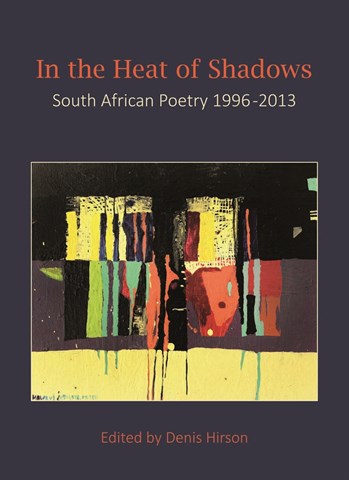Wamuwi Mbao reviews "In the Heat of Shadows" and finds that the collection ultimately asks whether, in the wake of the great historical moment of our transition to democracy, we have learned to live together.

Within the already obsecenely undervalued field of literature in South Africa, poetry continues to occupy a tenuous and marginal status. It has found new vitalities through the medium of spoken word, and through the use of sharing-mediums that have brought South Africa’s poetries into connection with the wider world. But while these developments have enabled poetry to survive the uncertain times in which literature finds itself, they’ve had to happen because major publishers are unwilling to take what could be an expensive gamble on poetry, which isn’t a guaranteed seller.
With this in mind, a collection like In the Heat of Shadows seems a bold if retrograde step. A primer on post-transition South African poetry, Shadows brings together 32 poets from various ends of the spectrum in a collection that attempts to tell a story of our country’s shaky freedom journey from rebirth to youth. It seems difficult to conceive of such a collection as not being a tyrannical ordering of disparate things, or an attempt to make transparent what by its nature is always partly shaded.
Capably edited by Denis Hirson, the voluminous collection is broad in scope and judicious in selection. The bias is towards older and more established names – Krog, Kgositsile and Kozain feature, amongst others – but younger voices do feature, albeit not in a way that suggests the pace of development.
The book opens with a masterful introduction which situates the poems and the book itself within wider contexts. The introduction gives a sampling of the various textures of freedom displayed in the poems, detailing how some of the poems speak to gnawing dissatisfactions with the insufficiencies of the Rainbow Nation. Khadija Heejer’s “I Am” is a stand-out, here:
I am the sound in your mouth as it fills with click and cursor
There I sit on the tip of your denial in the unmade bed of a South
Africa that slowed itself to constriction beyond apartheid and
Fashioned its identity on that broken chain of history.
There are poems that address the legacy and the mortality of Nelson Mandela. Here is the incendiary Vonani Bila:
You say you are ready to go to the grave,
Join friends in the other peaceful world.
What do you mean Baba Mandela?
To leave us orphaned?
What more do we want from you Baba Mandela?
A theme continually returned to is the TRC. This is not surprising, given the starting point of the project, but it poses some interesting questions about memory as a mediation that allows the subjective to access itself. Here is Antjie Krog:
Where do we go from here
Your voice slung
In anger
Over the solid length of our past
How long does it take
For a voice to reach another
In this country held bleeding beneath us.
Other poets choose the personal as a crucible for their vision of South Africa. Nathan Trantraal, whose Kaaps poetry has reinvigorated a genre long bowed under the weight of white South African preoccupations, contributes four intense vignettes whose quiet tone belies the often seething contents of his poetry. The video below shows Trantraal presenting two of the poems that are included in the anthology:
The most intriguing poems for me were those that capture the gritty and encrusted closeness of home-life, the poems that seek new forms of being in the familiar, in the tangible. Here, for instance, is Toni Stuart's introverted address to a home of the imagination, "Ma, I'm Coming Come":
In The Heat of Shadows succeeds because it goes beyond the desire to give account, to testify. In a sense, the collection resolves its own contradictions: the dates 1996-2013 become not so much a uniting thread as a zone of conversation, wherein poems of astonishingly diverse range (and why would they not be?) but and rub against each other, creating sparks that illuminate the shadow of South Africa's long collective hangover.
 SLiPStellenbosch Literary Project
SLiPStellenbosch Literary Project